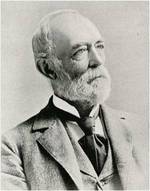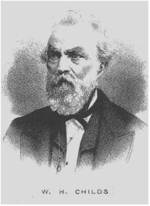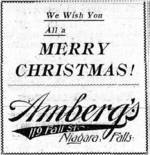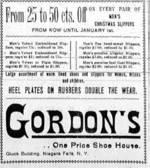Michelle Ann Kratts
There were three men who came with the carriage. Their pockets filled with stones. And there was no such thing as Time since if you really think of it—Time is a completely made up notion—just a measurement contrived by humans to organize the vast mystical nothingness of the universe. The horses knew about the nothingness of the universe. They had made their way swiftly through the falling snow and in through the black iron gate. They stopped when the driver commanded them to stop and they whinnied and lifted their hooves and scratched and shook their tails of the feathery whitestuff until they were used to the calm of the scene. Yes, of course, they had been here before. They would wait, unfastened, until the men were finished.
 William Pool (1825-1912), the first editor of the Niagara Falls Gazette, was a pioneer in Niagara County journalism. He was active in the Whig and Republican parties and staunch in his anti-slavery views. He is the author of Landmarks of Niagara County. William Pool is buried in Oakwood. One by one the men stepped down from the carriage to begin their task. The driver lit a cigarette, walked around a bit. Stared at the moon. It was midnight, Christmas Eve, and there was a little crack in the organization of the universe. Church bells were sounding nearby while things like snow and men and carriages with horses were seeping in through the open spaces. Mr. Childs, closest to the door, his body bent forward, a silken hat brushing against the doorframe, was the first to exit. He was followed by the newspaperman, Mr. Pool, and the gentle Mr. Clark, Practical Embalmer and Undertaker (and cabinet maker) who knew all about death and dying. They stood in silence for a moment until Pool finally broke open the icy solitude.
William Pool (1825-1912), the first editor of the Niagara Falls Gazette, was a pioneer in Niagara County journalism. He was active in the Whig and Republican parties and staunch in his anti-slavery views. He is the author of Landmarks of Niagara County. William Pool is buried in Oakwood. One by one the men stepped down from the carriage to begin their task. The driver lit a cigarette, walked around a bit. Stared at the moon. It was midnight, Christmas Eve, and there was a little crack in the organization of the universe. Church bells were sounding nearby while things like snow and men and carriages with horses were seeping in through the open spaces. Mr. Childs, closest to the door, his body bent forward, a silken hat brushing against the doorframe, was the first to exit. He was followed by the newspaperman, Mr. Pool, and the gentle Mr. Clark, Practical Embalmer and Undertaker (and cabinet maker) who knew all about death and dying. They stood in silence for a moment until Pool finally broke open the icy solitude.
--Lovely, lovely place in winter. Isn’t it so?
--Yes…Childs whispered.
You might think he was the quiet one (because of the whispering). But, no, you’re wrong. He was the one with the busy mind that screamed and kicked wildly behind flickering candle-eyes.
Clark knew this place well. Didn’t need to say a single word about the loveliness. Could see the underthings. The worms and the slugs that moved about unhindered in the warm spaces beneath the snow and the grass and the dirt. Little bits of unbroken life swimming among a sea of coffins. The men. The women. The children. All of them with their dusty bodies falling apart bit by bit until one with the wood and the velvet cushions. He imagined seeing so many of their sweet faces for the last time as he closed the lid on their humanity. There they were! One day picking up a book in the library. The next day… gone. So many library books never finished. Sad husbands and wives returning them in their place. Almost looking guilty about the whole affair. Strange thing death is. Hmm…yes...
 William H. Childs (1807-1885), an early merchant and insurance man in Niagara Falls, was a “zealous anti-slavery man” and possibly an agent of the Underground Railroad. His son, Joel, lost his life at the Battle of Shiloh. W.H. Childs is buried in Oakwood. He let a smile unfold. A secret little smile. One that crept along the side of his frozen lip. Only he could understand. Yes, indeed, it was magnificent to close that lid. Inherently delicious to be the last one to see the curvature of a face. He coughed once into a leather glove as if to say, "Yes, fellows...I know about these things....let me lead you along."
William H. Childs (1807-1885), an early merchant and insurance man in Niagara Falls, was a “zealous anti-slavery man” and possibly an agent of the Underground Railroad. His son, Joel, lost his life at the Battle of Shiloh. W.H. Childs is buried in Oakwood. He let a smile unfold. A secret little smile. One that crept along the side of his frozen lip. Only he could understand. Yes, indeed, it was magnificent to close that lid. Inherently delicious to be the last one to see the curvature of a face. He coughed once into a leather glove as if to say, "Yes, fellows...I know about these things....let me lead you along."
So they moved along in their fine array of overcoats (one being marked down from $10 to a glorious $5.90 at M. Brown’s Clothier and Hatter at 106 Falls Street) through the wide expanse of cemetery on this night of nights knowing, one and all, without any sort of announcement, where they were headed and for what business. Very elegant—the three of them dashing through the snow.
--Did you see in the papers? That deer caught in Steuben County? My God…Pure white…imagine that. Wish I’d been there. Didn’t say if it was a buck. Probably…would-ah…if it was. Pool lit a cigarette and blew a few smoky rings between his night darkened lips.
Childs was suddenly thrown into the mess of it and perturbed at the thought of the white deer.
--But why capture such a thing? Just let it be, I say. Should-ah let him go. Poor thing. Must-ah been lovely, just lovely. White fur and white snow. Lovely. (He a-hemed..)
He curled his hands into fists in his pockets. Felt the cold edges of the stones cut into skin. He imagined some nimrod in Steuben County had already killed the poor deer and probably had it hanging on his fiery mantle beside the Christmas tree for all to come at gawk at. Twinkling Christmas lights. Probably Christmas carols being sung…Once Again...Father Lead Me…Tours Te Deum…surely not as lovely as that sung on Christmas Eve at the First Presbyterian…but nonetheless... family gathered. Blood stains on white. Dripping onto carpets.
 No one said any more about the deer. But still Childs could not push it out of that corner it had taken up in his mind.
No one said any more about the deer. But still Childs could not push it out of that corner it had taken up in his mind.
They continued near the front of Oakwood, ever mindful of their work. Now below the beautiful angel. The sullen angel. Arms crossed in supplication. Head bowed. Carefully carved stone folds of holy robe. All pinned together by a stone mason. Maybe an Italian with loving hands. Here they placed their first piles of stones. Utter silence and the structure of the stones and the angel glaring down at them reminded Pool of art so it was then that he mentioned Cameron’s painting, Niagara Falls in Winter.
--Bought by some HH Warner of Rochester…purchasing price $30,000! Imagine that….
--No, couldn’t be.
Clark shook his head and imagined 30,000 pieces of anything at all. Slugs crawling (earth sticking to their bellies), squirrels, twigs, dead leaves, specks of dirt, flakes of snow. Just couldn’t be possible.
--But it’s true!
--And they say it’s regarded as the finest landscape ever painted in America, said Childs with pride.
 They all had seen it. Had even seen Peter Caledon Cameron. A colossal work, it was, this Niagara Falls in Winter. Like the falls, perhaps. Well, not quite…But it was one of the ones that let you hear the thunder and feel the spray on your face when you stood before it.
They all had seen it. Had even seen Peter Caledon Cameron. A colossal work, it was, this Niagara Falls in Winter. Like the falls, perhaps. Well, not quite…But it was one of the ones that let you hear the thunder and feel the spray on your face when you stood before it.
--Good perspective he had…ha! Pool added. His heavy boots crunching along. More smoke rings from his mouth to the sky.
 Then they spoke of how Mr. Cameron had painted his studies of Niagara Falls from a point in mid-air. Had lowered himself down the precipice with a tackle.
Then they spoke of how Mr. Cameron had painted his studies of Niagara Falls from a point in mid-air. Had lowered himself down the precipice with a tackle.
--A lot of guts these artists have…one standing for hours on end until the icicles formed on his beard…
--Pure mania, said Clark.
Indeed, they all knew the maniacs Niagara had summoned year after year.
--Yes, quite so, said Childs, concurring with both the “guts” statement as well as the “mania” statement.
--There are some things that bring you to your knees, he thought to himself. Some things.
 Their voices went on as their thoughts became more unbearable and heavy to carry. They filled the horrid blackness of the night with half laughs, coughs, with the clearing of throats. Of course, the moving on made it inevitable that they would soon pass over their wives’ graves, their chidren’s graves, their own graves. Probably the reason for all the small talk and nervousness. But how strange to be on this side of the whole thing! There was a cold pause upon coming nearer to these tender spots of earth filled with salty tears and their loved ones bodies. Childs passed beside the little one…”We’ll miss him when there is noble work to do…” Son, Joel. Reduced to an etching on some stone. 45thRegiment Illinois Volunteers. Died Battle of Shiloh. That’s it, though. There was nothing more. All comes to this.
Their voices went on as their thoughts became more unbearable and heavy to carry. They filled the horrid blackness of the night with half laughs, coughs, with the clearing of throats. Of course, the moving on made it inevitable that they would soon pass over their wives’ graves, their chidren’s graves, their own graves. Probably the reason for all the small talk and nervousness. But how strange to be on this side of the whole thing! There was a cold pause upon coming nearer to these tender spots of earth filled with salty tears and their loved ones bodies. Childs passed beside the little one…”We’ll miss him when there is noble work to do…” Son, Joel. Reduced to an etching on some stone. 45thRegiment Illinois Volunteers. Died Battle of Shiloh. That’s it, though. There was nothing more. All comes to this.
They came. They saw. They placed the stones--for they were the most diligent of men. Never give up the ship, these ones. Even some stones for the dreary Woolson graves—that strange set from Pool’s own family. A family of horrible circumstances. Tragic ends. Flashes of newsprint. Poison. Blood. Murder. Suicide. May they rest in peace. Requiescat in pace.
Then onto Strangers Rest (for they need the stones the most). Those forgotten travelers and the lost. A little pile of stones mean the most to those left behind. Keeps them going. The tragic ones who had no names or whose names had faded from every ledger. Those too young to hold a pencil. Those without a hand. Come back from the War, pieces missing. Those with only hands. Found in the River. Just a limb with a tattoo. Annie. Stones for all of them. Little calling cards.
Almost time to go. Things are closing up. The three men have emptied their pockets. The horses know about the nothingness of the universe. About the nothingness of Time. They whinny, scratch, shake their manes of snowflakes. Almost. Time. To. Go. So short these visits. But there are other things to do. They make their way back to the carriage. The driver never says a single word. In they go. Pool puts out his cigarette, the light is gone. He is the first to lower his head, climb in. He is followed by Clark and Childs. Solemn work. Not so bad but, indeed, solemn work. Just the remembering that there is an end is the toughest part. There are always other beginnings. But there is always an end.
The driver shuts the door, steps into his seat, calls to the horses. Sleigh bells ring, are you listening? One more stop for this night of all nights. The store of Louis Ehrig is always open if you believe Time is a made up notion. It is crowded with people. Frontier Mart. Falls Street. The attraction? A great Christmas tree trimmed in the most beautiful manner. Lighted wax candles on every branch. Mr. Ehrig proclaimed this evening that this IS the headquarters of Santa Claus. It’s December 24, 1855. It always is December 24, 1855, and the store is full to capacity. A carriage is on its way. Pockets full of money for gifts. Three men exit the carriage for Santa’s headquarters. Their children can hardly wait. Tomorrow is Christmas morning.